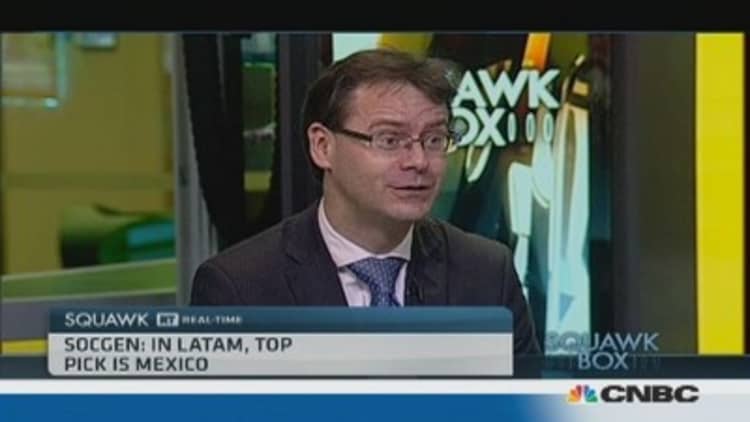Going bearish on emerging markets may have become the consensus call, but some fund managers are quietly turning more positive, citing attractive valuations.
"I fail to see any good reasons to be bearish," said Benoit Anne, head of emerging markets strategy at Societe Generale, in a note.
(Read more: Goldman: Cut your emerging markets exposure by a third)
In May, the Federal Reserve first broached the possibility it would begin tapering its $85 billion-a-month asset-purchase program, leading emerging market stocks and currencies to convulse amid fund outflows. Countries with perceived imbalances, such as current account and fiscal deficits, including India, Indonesia and Thailand, were among the hardest hit.
Markets stabilized and many recovered solidly in September after the Fed decided to keep its asset purchases steady, and didn't react strongly to news earlier this month that asset purchases would be cut to $75 billion a month starting in January.
But $13.7 billion has flowed out of emerging market bond funds for the year through December 18, while $6.3 billion has left emerging market equity funds over the same period, according to data from Jefferies.
(Read more: Next emerging market sell-off may be time to pounce)
"I am being told at this point by our clients is that we are the only ones on the sell-side calling for a global emerging markets rally in January," Anne said, but added "by then the impact of Fed policies would have been fully priced (in) and valuations in emerging markets would have improved to irresistible buying opportunities levels."
To be sure, he isn't calling for an across-the-board rally, advising "cherry picking." But he expects the differentiation will be based on valuations, rather than the "past obsession" with current account deficits.
"In markets, it is all about risk/reward as well as cost of carry, and when I look at emerging market currencies and emerging market rates, only a few markets strike me as majorly overpriced," he said.
(Read more: Why these emerging market taper victims can tough it out)
His view is in stark contrast to the consensus. Earlier this week, Goldman Sachs advised cutting emerging markets exposure by a third, expecting "significant underperformance and heightened volatility over the next five to 10 years."
A net 10 percent of global fund managers are underweight emerging markets, well below long-term averages, according to a December survey by the Bank of America-Merrill Lynch. Among developed markets, 34 percent of global fund managers are overweight Japan, 7 percent are overweight the U.S. and 43 percent are overweight the Eurozone, the survey found.

But Anne isn't alone.
"The G-3 economies are headed toward synchronized (albeit moderate) growth in 2014. This positive news, however, is already priced into most equity markets," said Jeff Hussey, global chief investment officer at Russell Investments, which has $246.8 billion under management.
Global developed market equities have re-rated, with the trailing price-to-earnings ratio rising to 16.4 times at the end of November from 13.8 times at the end of 2012, the report said.
"P/E ratios (in developed markets) are unlikely to rise much more," the report said. "The most persistent and significant valuation advantages lie in emerging markets."
(Read more: How some emerging markets get taper insulation)
"Uncertainties over credit conditions in China and the impact of Fed tapering on current account deficit financing are reasons to be cautious for now, but this is an opportunity that warrants close attention," the note said.
"Value there remains strong, and the prospect of increasing export demand from developed economies will support emerging market growth," the note said, adding Russell's conviction there remains positive for the longer term, even though it is tactically neutral as it watches for Fed tapering effects.
Within fixed income, Russell recommends hard-currency emerging market debt, priced in dollars or euros, over local-currency debt amid expectations tapering may weigh on emerging market currencies over the coming months.
—By CNBC.Com's Leslie Shaffer; Follow her on Twitter @LeslieShaffer1

